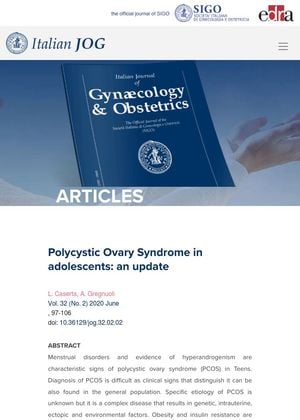Polycystic Ovary Syndrome in Adolescents: An Update
June 2020
in “
Italian journal of gynaecology & obstetrics
”

TLDR The document concludes that PCOS in teenagers is hard to diagnose, influenced by various factors, and should be managed with lifestyle changes and medication.
The document from 3 years ago, "Polycystic Ovary Syndrome in adolescents: an update", discussed that Polycystic Ovary Syndrome (PCOS) in teenagers is characterized by menstrual disorders and signs of hyperandrogenism. However, diagnosing PCOS is challenging as its clinical signs can also be found in the general population. The specific cause of PCOS remains unknown, but it is a complex disease influenced by genetic, intrauterine, ectopic, and environmental factors. Obesity and insulin resistance are commonly associated with PCOS, putting patients at risk of metabolic and cardiovascular diseases. The paper recommended lifestyle changes and drug therapy for all patients to control and counteract the development of hyperandrogenism and menstrual disorders.





